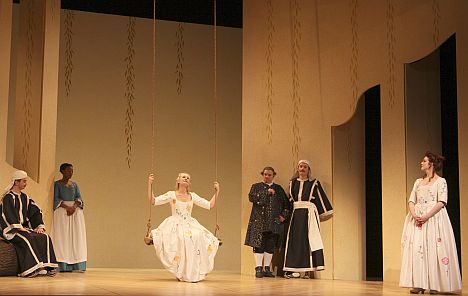 United Kingdom Wolfgang Amadeus Mozart, Cosi fan Tutte: Soloists and Orchestra of English Touring Opera / James Burton (conductor), Northcott Theatre, Exeter, 18.3.2013
United Kingdom Wolfgang Amadeus Mozart, Cosi fan Tutte: Soloists and Orchestra of English Touring Opera / James Burton (conductor), Northcott Theatre, Exeter, 18.3.2013
Libretto by Lorenzo da Ponte
(English translation by Martin Fitzpatrick)
Cast:
Ferrando Anthony Gregory
Gugliamo Toby Girling
Fiordiligi Lorna Bridge
Dorabella Kitty Whately
Despina Paula Sides
Don Alfonso Richard Mosley-Evans
Production:
Director: Paul Higgins
Designer: Samal Blak
Lighting Designer: Ace McCarron

Photo (c) ETO
Samal Blak’s minimalist set creates an immediate impression of contemporary elegance and simplicity, in creams and neutral colours, which are echoed in the costumes of the four main characters. The lavish and informative programme (covering all three operas in the present ETO tour) includes a section on the designer’s thoughts for his work on Cosi fan Tutte and his inspiration from 18th century paintings, particularly Fragonard’s painting “The Swing” and the need to create a confined space which is “physically playful”. My 1969 edition of Kobbe’s Complete Opera Book comments on the “bright Mediterranean light” and Bay of Naples in the background of the stage, for this opera, and I well remember previous productions I have seen at the Royal Opera House, Covent Garden and other houses, which featured more traditional sets, showing classical columns and distant view of the Bay of Naples. This bright contemporary set may evoke the bright sunlight of the Mediterranean, and a contained space for the action which will work in the many theatres on the tour, but it is does not remotely suggest the Bay of Naples!
This backcloth and side walls featured willow leaves stencilled in columns, rather than the olives which so predominate around the Mediterranean; and as “props” what looked like a copy of a large oak log; a smaller version of my old school trunk (C20!) and a swing – on which Fiordiligi had to climb and stand on to sing part of her main aria, This, Lorna Bridge, accomplished without an accident.
This opera needs careful production to combine the beautiful music, the singers’ dual roles as actors in this “opera buffa” and artists and musicians while steering a path between comedy and buffoonery, interspersed with pathos, without letting it degenerate into farce. This production achieved this, and the new English libretto was up-to-date, but sympathetic. Despina’s “shaken not stirred” James Bond joke went down well with the Exeter audience. The diction throughout was very clear and the screens showing the words were barely needed. Conductor James Burton maintained a good pace, working sensitively with the singers and his excellent little orchestra.

Photo (c) ETO
The main cast looked Impressive on paper. With a host of scholarships and experience in opera houses between them, it comprised well-rehearsed and stylish Mozart singers. Paula Sides portrayed a world-wise and cheeky Despina, relishing her sub-roles of the Notary and Dr Bartolo, and wearing a very elegant dark green dress. Richard Mosley-Evans, as the wily Don Alfonso, commanded the stage in his sumptuous dark blue brocaded outfit. The neutrally clad “quartet” of Fiordiligi, Dorabella, Gugliemo and Ferrando looked the part of the pretty ladies, in beautifully embroidered dresses, and the handsome officers/Albanian gentlemen. The romps and pathos were in keeping with the music and Anthony Gregory (Ferrando) and Toby Girling (Gugliemo) worked well together, their voices blending and they added humour to their roles. Lorna Bridge had stepped into the role of Fiordiligi (replacing Laura Mitchell) and made the role her own, doing more than justice to her two big arias. “Come Scoglio”, in particular, was sung with great musicality and passion. Kitty Whately made a striking Dorabella and was in excellent voice.
This production made the story seem believable and it was sung and played with great style. It was stylish Mozart, even if the likeable but incredibly minimalist set did little, if anything, to give even an impression of the Mediterranean landscape in which this opera was set
Angela Boyd